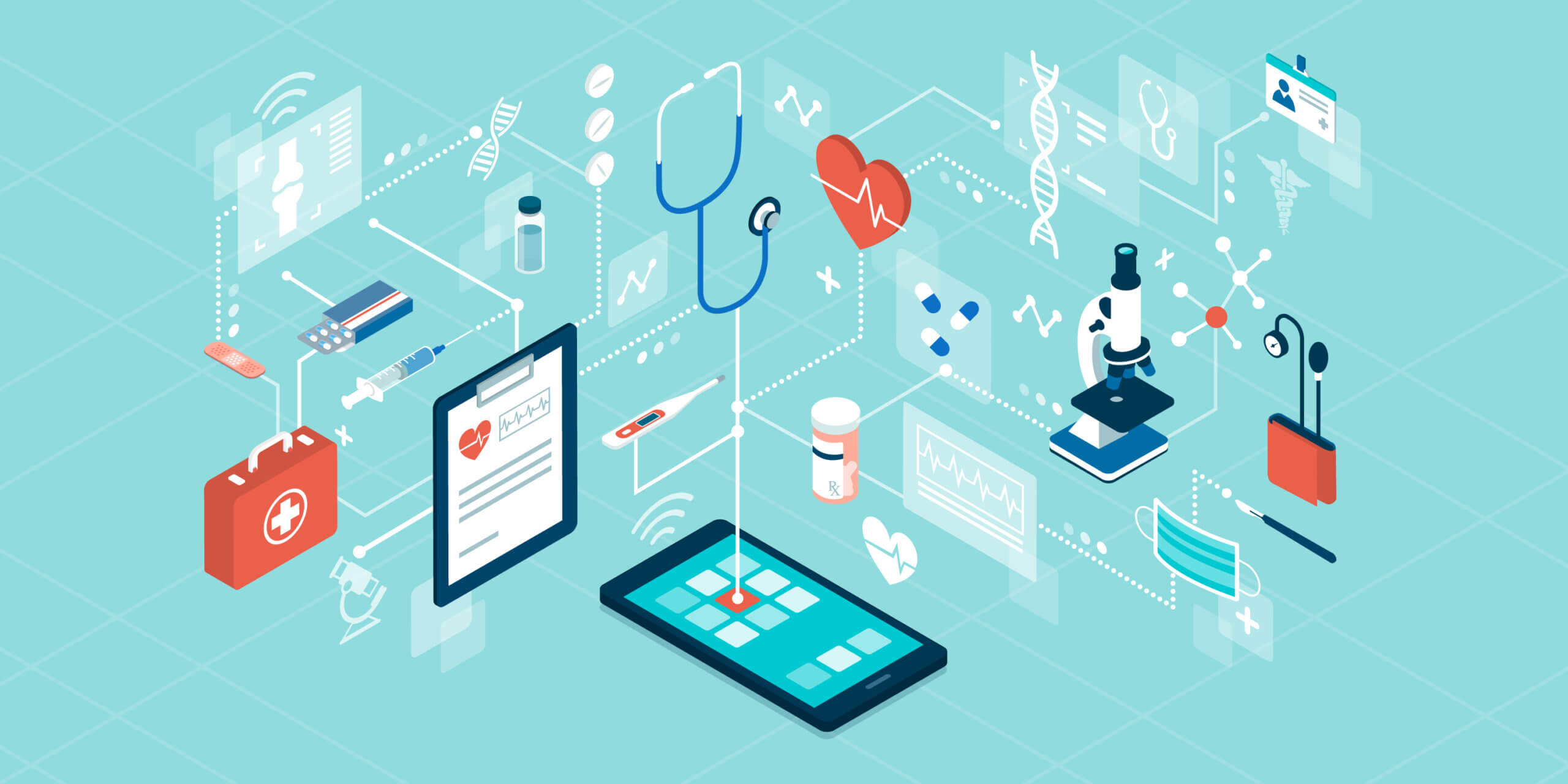The adoption of cloud solutions has become popular across various industries, including finance and education, and the healthcare sector is no exception. With its potential to digitally transform systems, it can help hospitals achieve the efficiency they have always dreamed of. Let us tell you more about cloud computing and its benefits in healthcare software development. We will begin this blog with a brief introduction to cloud solutions.
What are Cloud-Based Solutions?
A cloud solution is any service, application, or storage that can be accessed over the internet rather than being hosted on-premises. It can be accessed through the provider’s shared cloud computing framework, which leverages a network of remote servers to store, manage, and process data. So, the businesses don’t have to maintain costly physical infrastructure.
Features of Cloud-Based Software
Cloud services help enhance collaboration, decrease IT costs, and allow secure storage and sharing of patient data over the internet. Below are a few advantages of cloud-based solutions:
• Cost-effectiveness
You don’t have to spend money on maintaining or upgrading the infrastructure; instead, you only have to pay a monthly fee to access required services.
• Flexibility
Cloud solutions are customizable to meet the business’s needs, giving them the flexibility to add or remove features.
• Scalability
The scalability of the cloud solutions ensures smooth operations during emergencies or patient surges.
• Productivity
Cloud services enhance employee productivity by providing faster access to data from anywhere and at any time. They also streamline workflows through automatic updates, centralized data, and reduced downtime, thereby speeding up tasks.
Why Are Healthcare Providers Switching to Cloud-Based Solutions?
The process of migration can be complex, with a high risk of data breach and unauthorized access to patient data. Therefore, it is prudent to hire healthcare software development services to prevent downtime, as the lives of patients depend on the seamless flow of data. However, once the migration is complete, healthcare organizations can reap benefits such as reduced costs, improved compliance, and increased operational efficiency. Let us give you the reasons to justify why moving to the cloud is the best option.
Data Storage
Cloud systems play a crucial role in data storage, offering scalable and cost-effective solutions. In contrast to traditional on-site servers, the cloud enables healthcare providers to store large amounts of patient data without any need for expensive hardware. The cloud platforms are also vital, as they help ensure high availability and secure backup, allowing 24/7 access to medical records and enhancing patient and provider coordination.
Scalability
Hospitals and healthcare organizations process large amounts of data daily from various sources, including wearable devices, electronic health records (EHRs), medical imaging systems, and patient monitoring devices. With cloud services, healthcare organizations can access unlimited storage capabilities, which they can scale up or down as needed to meet demand. This can also help healthcare organizations save money, as they would otherwise have to spend on upgrades and physical data centers.
Improved Data Security
Health data is highly sensitive, as it contains patient information, including name, medical history, medication records, treatment plans, and contact details. Additionally, regulations such as GDPR and HIPAA also mandate the protection of data during storage and transfer. Keeping this in mind, cloud services offer features such as authorized access, multi-factor authentication (MFA), and powerful encryption. These features are helpful for healthcare organizations in reducing the risk of data breaches, thereby creating a secure environment for managing healthcare data.
Disaster Recovery
Another significant advantage of migrating to cloud systems is that there is no data loss, ever. The cloud offers the option of automated backups and faster data recovery in the event of a breach or data leakage. This helps healthcare providers maintain the high standard of care even during disruptions to operations. Additionally, this is also one of the regulatory requirements for data protection.
Decreased IT Burden
The cloud services enable healthcare institutions to pay only for what they use, which is opposite to conventional IT setups, where large amounts of money are required for server maintenance and staff. This helps hospitals avoid upfront costs, as cloud vendors also handle system updates, the addition of security patches, and performance adjustments.
Enhanced Collaboration
Cloud-based healthcare software development enables real-time access to data from any location. This is essential for maintaining collaboration between healthcare staff to support coordinated care. It also facilitates mobile access and telemedicine, enhancing the service delivery in remote locations. Moreover, this access also reduces duplicate testing and the chance of medical errors. All in all, cloud-based systems positively contribute to increased workflow efficiency.
Integration of Digital Solutions
Cloud solutions are flexible, allowing for the easy and swift deployment of new software and digital tools. This helps the hospitals in the fast adoption of technologies like:
• AI diagnostics
• Inclusion of patient portals
• Mobile health apps
• Integration of IoMT
The faster deployment is practical for healthcare institutions as it allows them to provide quick responses to changing patient needs and regulatory changes. Additionally, with minimal hardware requirements, cloud solutions reduce delays, which is particularly beneficial in emergencies or rapidly changing environments.
Centralized Data
With cloud platforms, healthcare providers can more easily manage their data across multiple locations and systems. They offer a single source of patient records containing lab results, billing information, and much more. This enables easy access to data, maintains compliance, reduces errors, and streamlines reporting and auditing processes. Moreover, this also helps doctors allow better diagnosis and improve coordinated treatment.
Environmental Sustainability
The physical infrastructure consumes significant financial resources, and cloud solutions contribute to sustainability by providing energy-efficient data centers. Therefore, by migrating to the cloud, many healthcare institutions can reduce energy costs and their carbon footprint. This aligns with the need for climate-friendly solutions and demonstrates an organization’s commitment to social responsibility and sustainability.
Advanced Analytics
Having a cloud means you have a treasure of data, which can help you gain deeper insights into patient information. This can help doctors analyze patient data and detect any anomalies or abnormalities, leading to early detection and intervention. Furthermore, the implementation of AI technology can aid in the faster and more accurate detection of diseases that may escape the human eye.
Personalized Experience
With the advancement in technology, patients now expect personalized healthcare experiences. The cloud solutions can be used to create virtual environments required for telehealth. This also supports automation (such as automated speech recognition) and streamlines workflows.
Medical Research
Medical researchers can benefit from the data storage and leverage the computing power of the cloud. Cloud systems may also offer options for handling complex data and supporting high-speed workflows.
Finance Operations
Migrating to the cloud also assists in efficiently managing the finances in healthcare. This technology allows real-time access to claim processing and billing. The automated processes for insurance verification and patient invoicing help reduce manual errors, ensuring data compliance and security. The cloud-based tools also integrate seamlessly with Electronic Health Records (EHRs) and accounting systems.
Conclusion
There are multiple advantages, including enhanced data security, compliance with regulatory requirements, and improved patient care. The healthcare providers are adopting cloud solutions to meet their clinical and operational needs. By leveraging healthcare software development services, you can obtain a customized solution tailored to meet your organization’s specific needs.



